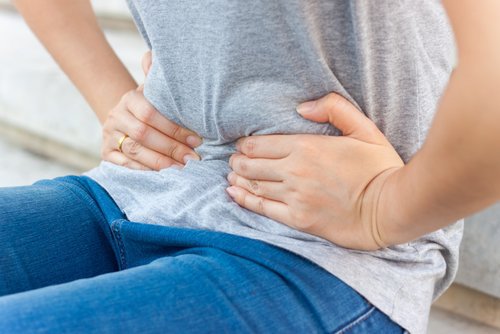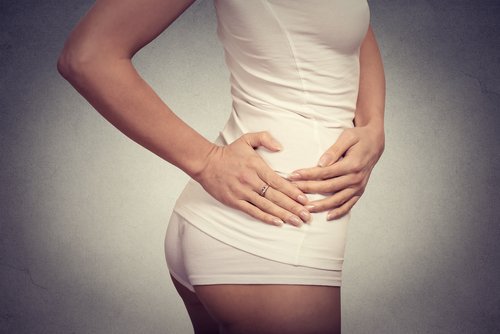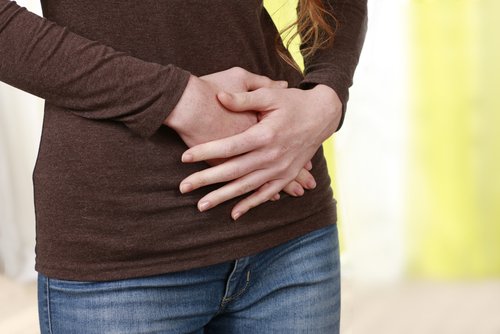Why Do I Feel Bloated All the Time?

It doesn’t matter what you do, how much you exercise or what diet you’re on… Sometimes, it feels like your stomach will never go down a size, making you feel bloated. The same thing can happen with your legs.
Beyond the problem it presents for your appearance is the feeling of heaviness and discomfort that can prevent you from enjoying everyday activities.
Do you want to know why you’re bloated all the time? We’ll tell you in this article.
Possible causes of bloating
The abdomen is more prone to inflammation than any other area of the body, making us feel bloated, and not necessarily too happy about what we see when we look in the mirror.
While it isn’t serious it can be a nuisance because it’s often accompanied by pain, gas or constipation.
The main causes of stomach bloating are:
You should read: Natural Infusions for Constipation
Premenstrual syndrome
According to this information by the Mayo Clinic, this is one of the most common causes. During this time just before menstruation, the female body reduces its production of prostaglandins, which leads to fluid retention and swelling in the abdomen and breasts.
Trapped gas

Fluid retention
The main causes of fluid retention are poor lymphatic circulation, a sedentary lifestyle, and excess salt and sugar. Furthermore, not drinking enough water or sitting or standing for hours at a time are some of the main causes of bloating, as they promote fluid retention.
Food intolerances

Food intolerances affect everyone differently, but can cause discomfort and bloating after ingesting certain foods. They can also cause symptoms such as constipation or diarrhea, depending on the individual case. People often realize they are suffering from a food intolerance because symptoms begin after eating a certain food.
The most common is lactose intolerance (a sugar in milk), which, according to this information from the National Institute of Diabetes and Digestive and Kidney Diseases, occurs when the body cannot produce enough of an enzyme called lactase. Another common problem is gluten intolerance.
Hormonal disorders
When fluid accumulates in the legs or lower abdomen, it can be caused by a liver, kidney or cardiac disease. Taking certain medications can cause hormonal changes and weight gain, according to this study of overweight pregnant women at the La Paz University Hospital in Madrid.
Irritable Bowel
Trapped gas in the intestine is another cause of bloating. This condition causes several different symptoms: abdominal pain, difficulty going to the bathroom, chronic or recurring intestinal discomfort.
Eating too fast

Sometimes, our busy lifestyles cause us to eat too quickly. This is a bad habit for several reasons:
- Firstly, because it takes the brain almost half an hour to feel satisfied after eating, causing you to eat more than necessary.
- Secondly, it increases the likelihood of you swallowing more air, which ends up trapped in the intestine, causing bloating.
Soft drinks
Soft drinks are usually carbonated and full of sugar, which can cause bloating for a number of reasons. The gas in the drinks often distends the abdomen. Plus, the high calorie content can lead you to gain weight, as stated in this study by the University of San Sebastian in Santiago, Chile.
Be careful because – for the reasons mentioned above – sparkling water can also cause the sensation of an inflamed abdomen even though it doesn’t contain any sugar.
Eating too much or too little fiber
A lack of fiber is associated with constipation (and the bloating it causes), but you shouldn’t eat too much of it either.
Too much fiber can actually be counterproductive because it can cause diarrhea and intestinal inflammation.
Too much refined flour

It is believed that eating foods rich in flour, such as baked goods, pizza and pasta, can lead to a lack of digestive strength. This means that the stomach runs out of digestive enzymes before it has finished digesting foods.
These foods are then “stored” in the wrong place, and begin to decompose, causing gas, dyspepsia and abdominal bloating. However, there’s no scientific evidence to support this belief.
Tips to reduce abdominal bloating
Once you’ve identified the reasons why your stomach bloats, the next step is to change a few habits and take some action to keep it from happening.
Here are some tips to help you:
- Reduce your salt intake.
- Drink at least two liters of water a day. As confirmed by these studies carried out by the Spanish Federation of Societies of Nutrition, Food and Dietetics Associations, water is essential.
- Avoid taking laxatives because they can cause dependency and diarrhea.
- Eat your food slowly and chew each bite several times.
- Avoid foods that cause gas (such as legumes and artichokes).
- Get tested for food intolerances.
- Replace “forbidden” foods with healthy alternatives (for example, try drinking almond milk instead of cow’s milk).
- Be sure to eat enough fiber every day. Include more raw fruits and vegetables in your diet.
- Eat less fried and junk food. Bake, steam or boil your food.
All cited sources were thoroughly reviewed by our team to ensure their quality, reliability, currency, and validity. The bibliography of this article was considered reliable and of academic or scientific accuracy.
Yonkers, K. A., O’Brien, P. M. S., & Eriksson, E. (2008, April). Premenstrual syndrome. Lancet (London, England). https://doi.org/10.1016/S0140-6736(08)60527-9
Enck, P., Aziz, Q., Barbara, G., Farmer, A. D., Fukudo, S., Mayer, E. A., … Spiller, R. C. (2016). Irritable bowel syndrome. Nature Reviews. Disease Primers, 2, 16014. https://doi.org/10.1038/nrdp.2016.14
This text is provided for informational purposes only and does not replace consultation with a professional. If in doubt, consult your specialist.








